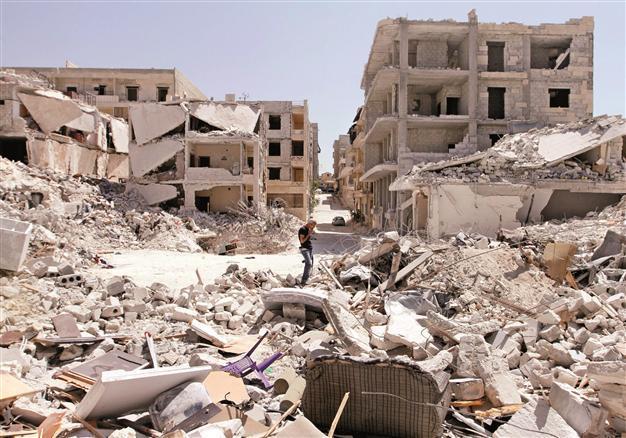Syria toll passes 100,000 as hopes fade for peace summit
BEIRUT / GENEVA

A Free Syrian Army fighter carrying his weapon, smokes as he stands on the rubble of damaged buildings in Kefr Hamra, Aleppo in Syria. AP Photo
More than 100,000 people have been killed in Syria, a watchdog said in a new toll yesterday as hopes begin to fade away for a peace conference with no agreement in sight between the United States and Russia.The Syrian Observatory for Human Rights said the death toll was now 100,191 people. That figure includes at least 36,661 civilians, more than 3,000 of them women and more than 5,000 of them children under the age of 16. On the regime side, the group reported the deaths of at least 25,407 army soldiers, 17,311 pro-regime militia and 169 members of the Lebanese Shiite group Hezbollah, which has dispatched fighters to battle alongside the Syrian army.
The group counted another 2,571 unidentified people killed in the fighting throughout the war-torn country up until June 24. The United Nations said June 13 the death toll in Syria reached at least 93,000 at the end of April, but the true number of victims from the violence may be much higher.
The new toll came as talks between the United States and Russia to set up a Syrian peace conference produced no deal on June 25, with the powers on either side of the two-year civil war failing to agree when it should be held or who would be invited.
Kerry, Lavrov to meet next week
Washington and Moscow announced plans for the peace conference last month, but their relations have since deteriorated rapidly, as momentum on the battlefield has swung in favor of President Bashar al-Assad. Washington decided this month to supply military aid to the rebels fighting al-Assad, while Moscow refused to drop its support for the Syrian leader it has continued to arm.
After five hours of talks in Geneva sponsored by the United Nations, Russian Deputy Foreign Minister Gennady Gatilov said there was still no consensus on a role for al-Assad’s ally Tehran, or on who would represent the Syrian opposition.
“There is a disagreement on whether or not, for example, Iran should take part. From our point of view, Iran’s participation in the conference is necessary because it can play an important role as a country of the region,” he told reporters.
Washington has opposed including Iran in the talks, amid continuing disagreement about its disputed nuclear program. Gatilov added that Russia wanted the opposition delegation to represent all the main groups, without saying which he meant.
With such issues unresolved, the conference is not expected now to be held before August or even September. The U.N.’s peace envoy for Syria Lakhdar Brahimi said a timeline for a proposed peace conference in Geneva would almost certainly slip. “Frankly, I doubt that the conference will take place in July,” he said ahead of U.S.-Russia talks.
U.S. Secretary of State John Kerry and Russian Foreign Minister Sergei Lavrov will meet next week, and further talks on the conference are expected to follow, a U.N. statement said.
















